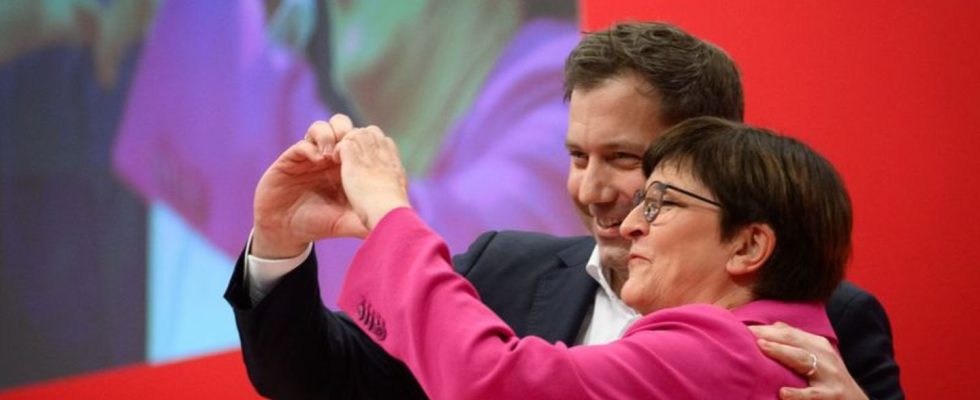Federal party conference
SPD strengthens party leadership despite mood of crisis
Remaining at the top of the party: Lars Klingbeil and Saskia Esken after their re-election. photo
© Bernd von Jutrczenka/dpa
The SPD has to hold its party conference in the middle of the budget crisis. On day one there was strong support for the management staff. Frustration against the Chancellor and the traffic lights could still be released.
It’s the invisible elephant in the room: While the budget crisis in political Berlin has dominated the headlines for weeks, the delegates from the Chancellor’s party held their ground SPD conspicuously back at the party conference.
Hardly any attacks against the traffic light partner FDP, which recently questioned social benefits. The Chancellor also initially got off lightly. In return, the delegates sent a strong signal of support for the party’s leadership. Saskia Esken and Lars Klingbeil were confirmed as party leaders with good results, and General Secretary Kevin Kühnert even achieved the third-best result of all SPD general secretaries.
The 34-year-old received 92.55 percent of the votes. There was certainly a fear in the SPD that he could be punished on behalf of Chancellor Olaf Scholz. This is what happened to Scholz himself in 2003, when he only received 52.6 percent in the general secretary election. This was understood as a slap against the then Chancellor Gerhard Schröder and his social reforms.
Klingbeil received 85.6 percent of the valid votes at the federal party conference, only slightly less than 86.3 percent in 2021. With 82.6 percent, Esken achieved a significantly better result than two years ago with 76.7 percent. Given the mood of crisis and the SPD’s miserable poll numbers, this is a clear vote of confidence.
SPD is almost in election campaign mode
In the first two years of their term in office, Esken and Klingbeil saw their task primarily as supporting Olaf Scholz as the first SPD head of government in 16 years in the difficult three-way alliance with the Greens and FDP. However, crushing election defeats in Hesse and Bavaria, dissatisfaction with the traffic light course in migration policy and, most recently, the budget crisis have caused unrest in the party and led to calls for the SPD to raise its profile.
At the party conference it became clear: the SPD leadership has long been turning its attention to the next federal election, which as things currently stand will take place in 2025. In their speeches, Esken and Klingbeil – after all, party leaders of the largest government party – attacked their political opponents as aggressively as if they themselves were in the opposition. Esken accused the CDU of political vandalism. “With this Merz CDU we truly have the most populist opposition of all time,” she said. Klingbeil accused CDU leader Friedrich Merz of raving about the economic policy of the 1990s. “Yesterday’s Frederick will never be the future of our country,” he emphasized.
Next year there will be the European elections, three state elections in East Germany and several local elections. The big question here is: Will the AfD’s soaring and simultaneous crash of the traffic lights continue, which has been exacerbated by the current budget crisis? In the most recent polls for the federal election, the SPD only got 14 to 17 percent – compared to 25.7 percent in the 2021 election. The three traffic light parties together fell from 52 percent in 2021 to 33 to 38 percent today in nationwide surveys .
Crisis tax for the super rich
The SPD wants to score points against the Union by raising taxes for the super-rich and easing the debt brake. After a long debate, the delegates adopted a key motion that also promises tax relief for 95 percent of the population. The citizens with the highest wealth should be asked to pay a one-off crisis levy. In addition, inheritances and gifts should be taxed higher so that multimillionaires and billionaires participate more in financing the common good.
The party youth had vehemently pushed for the debt brake to be abolished. “Nothing threatens the future of our generation more than this damned debt brake,” said Juso boss Philipp Türmer. The Jusos and the party executive committee later agreed on the wording that rigid limits on borrowing, as currently stated in the constitution, would be rejected. “They prevent investments and impair the state’s ability to act.” Türmer saw this as a general rejection of the debt brake. It is no longer just about exceptions for investments, but rather for the state’s ability to act, including the success of the social-ecological transformation and strengthening social cohesion.
Keeping quiet during budget crisis talks
The party leadership emphasizes that these priorities had already been set before the historic debacle over the federal budget. But now the demands are likely to be even more relevant. Scholz, Finance Minister Christian Lindner (FDP) and Economics Minister Robert Habeck (Greens) have been struggling for weeks to plug a 17 billion euro hole in the 2024 budget. The SPD would have liked to have reached an agreement before the party conference.
Now Scholz will probably have to speak to the 600 delegates on Saturday without a finished budget plan in his pocket. The delegates, one gets the impression, feel forced to keep quiet the day before. Just don’t torpedo the negotiations between the traffic light leaders. The mood is actually quite charged – especially since the Spiegel title with the Scholz quote “We finally have to deport on a large scale.” The government’s course on the issue of migration goes quite against the grain of the left wing of the party.
However, Scholz was initially a supporting actor. When he was greeted, he received polite applause, but the delegates remained seated. Two years ago, the party conference welcomed the newly elected Chancellor in a very different way.

